A few weeks back, I decided to focus my ecofeminist action on planting a vegetable garden. I landed on this idea after I was continuously brought back to my sense of place, being actively involved in nature, and planting vegetables with my mother as a child. I believe that the tranquility that nature provides brings someone back to themself. Kingsolver states from Knowing Our Place that “people need wild places. Whether or not they think they do, they do. They need to experience a landscape that is timeless, whose agenda moves at the pace of speciation and ice ages (Kingsolver 2). Every morning while watering the plants I am reminded of where I come from, the kind of person I want to be, and the love I have for the Earth.
In my last blog posting, I discussed how I used old biodegradable egg cartons to start the vegetable garden in. I planted broccoli, onion, tomato, cucumber, and hot peppers. Since then, the vegetables have grown exponentially. I decided on putting the plants in our mudroom where it would get the best light as well as using a grow light so that the plants can truly thrive.
Below are some updated images of my vegetable garden.
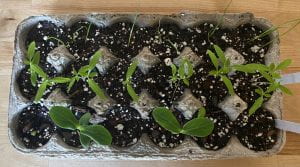
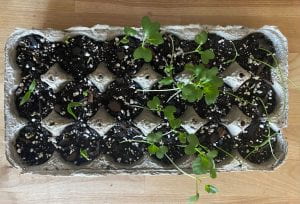
The Herbs and Vegetables Under a Grow Light
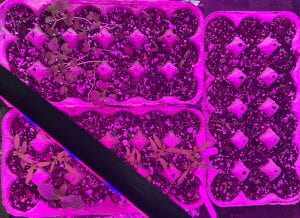
As mentioned in my last blog as well, when my roommate came home from work and realized that a vegetable garden was being created, he instantly wanted to get involved by planting an herb garden.
Below is a picture of my roommate’s herb garden and the progress it has made so far.
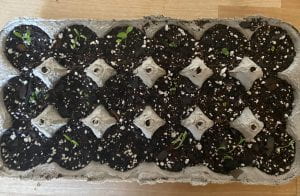
There were, however, a few issues that I ran into. The first issue was that my landlord and friend did not want a vegetable garden planted directly into the earth in our backyard. At first, he asked, “why do you even want to plant a vegetable garden in the first place?” He also stated that he did not want a garden in general, and that he did not want to deal with the “upkeep” even though he would have no involvement with the gardening process itself or keeping the garden healthy, weeded, and thriving. Although he understood that he would not be involved with the garden in any way, shape or form, he still did not want one in backyard. Therefore, I negotiated with him until we came to a mutual agreement. I would build a raised garden bed so that it would not ruin the grass, it would keep all parties happy, and I could transport the garden elsewhere if necessary.
Below are a few ideas as to what I want the raised garden to look like. My roommate just finished building a deck, and my boyfriend is in the process of renovating his bike shop, therefore there is a lot of wood and building supplies that can be repurposed for the creation of a raised garden.
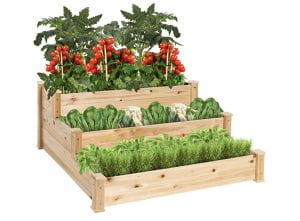
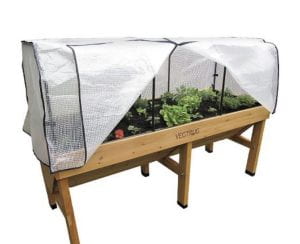
Here is a photo of my roommate and boyfriend organizing the wood for building.
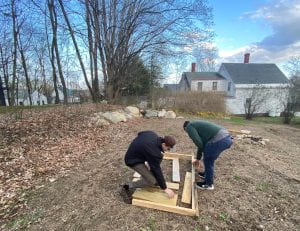
After the conversation I felt invigorated and proud that I stood up for what I believed in. Ultimately, I hope that he comes to appreciate the garden and realize the meaning behind what it holds. Maybe one day he will even create a garden of his own and have a hand in reinventing our current food system and have a newfound vigor for nature and life. The conversation with my landlord reminded me of the article Gender Equality and State Environmentalism by Kari Norggard and Richard York in regard to the difference between men and women when it comes to the environment. Women are the first to see disparities within the natural surroundings around them as well as being more environmentally aware then men and boys (Noorgard, York 508). Women across the world are also more likely to become involved with organizations that help protect our environment (Noorgard, York 509). Through these statistics, it can be stated that through socialization women are more often than not looked at as nurturers, caretakers and family oriented, therefore environmental concerns and nature are more associated and connected with women than men (Noorgaard, York 508). As someone who has had discussions with my landlord about environmental responsibilities such as recycling and single use plastics before and have discussed why it is beneficial for our earth and people’s livelihood, I couldn’t help but think about how many other people are out there who aren’t educated on these topics or do but just don’t care because they think that what they do won’t make a difference. It made me more determined than ever to stand together with the people in my life who are just as connected to nature as I am to fight for environmental justice and work towards equality within this patriarchal and capitalist world we live in.
After reading about different means of activism from the article 13 Simple Ways to Support feminist Activism on International Women’s Day I realized that just by having a conversation it can make all the difference. Sam Smethers, an equality campaigner states, “Campaigning for women’s rights isn’t just about protesting on the streets. Often the most empowering activities involve educating yourself about women’s issues, and standing in solidarity with women and communities whose voices are more marginalized than your own” (Devaney 2020). Throughout this class I have been educated on what ecofeminism is and all the forms that comes with it. I have learned about intersectionality and the association that women have to nature. I have learned about the atrocities of the meat and commercial industry. And I have learned about myself, what I am passionate about, and how to use my own voice to stand up for what I believe is right. Through the act of gardening, I was able to influence those around me and inspire them to do the same. I was able to influence my roommate and boyfriend to get involved in the process which led to them discussing the gardening process with other people. Just by planting fresh produce, I was able to bring people together, get them more connected to nature, practice a more sustainable action, and help benefit my own health as well as the people in my life, all from one blog posting.
Works Cited:
Devaney, S; Crocket, M. (2020). 13 Simple Ways to Support Feminist Activism on International Women’s Day. Stylist. https://www.stylist.co.uk/visible-women/feminist-activism-uk-examples-ideas-intersectional-feminism-activists-international-womens-day/194468
Kingsolver, Barbra. Knowing Our Place. 1-2.
Norgaard, Kari., & York, Richard. Gender Equality and State Environmentalism. Gender & Society. August. 2005. https://pages.uoregon.edu/norgaard/pdf/Gender-Equality-Norgaard-York-2005.pdf
